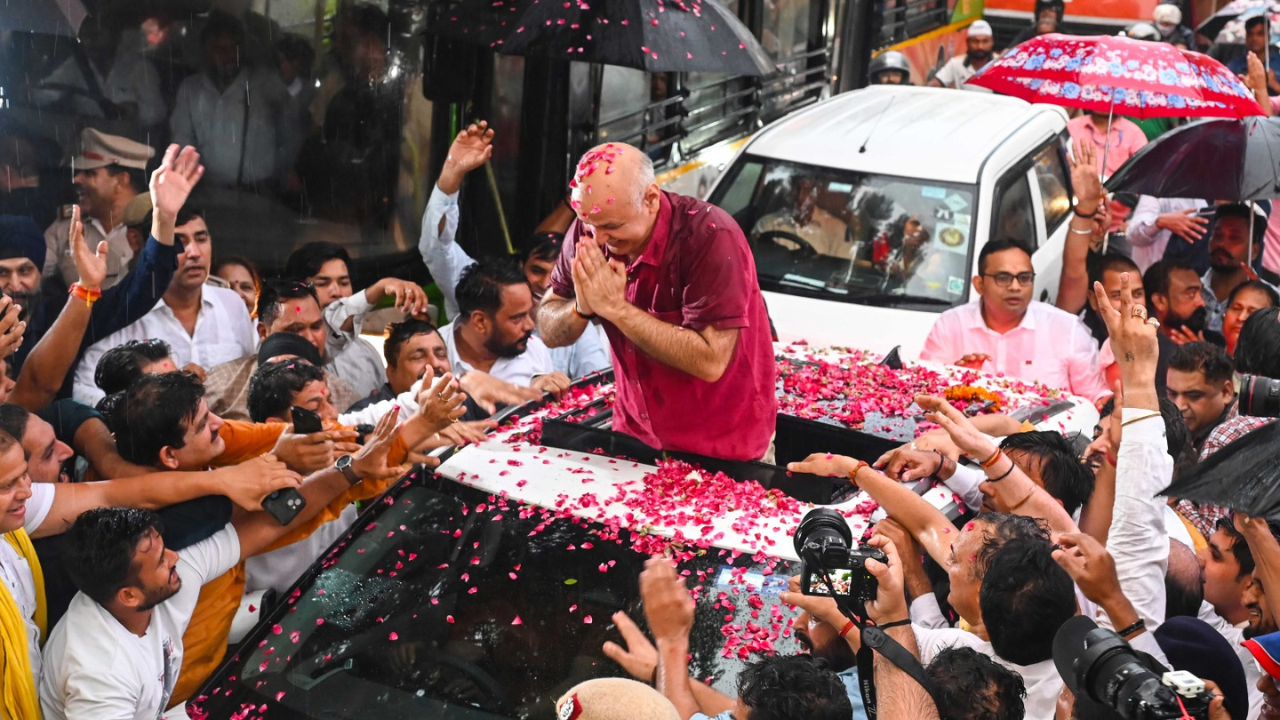[ad_1]
Sisodia, who obtained a number of setbacks by decrease courts over the last 17 months, lastly obtained bail because the Supreme Court docket reiterated the precept of ‘bail is the rule, and jail is an exception’.
Sharply criticising the decrease courts, the highest courtroom stated, “As noticed again and again, extended incarceration earlier than being pronounced responsible of an offence shouldn’t be permitted to grow to be punishment with out trial.” The bench of Justices BR Gavai and KV Viswanathan stated, “It’s excessive time trial courts, excessive courts recognise precept of bail is the rule and jail is an exception.”
However what is that this precept?
The ‘bail is the rule, and jail is the exception’ precept was first used within the 1977 landmark judgment of the ‘State of Rajasthan vs Balchand alias Baliya’ case.
The ruling underscored that bail needs to be denied solely in circumstances the place there’s a threat of the accused fleeing from justice, obstructing justice, repeating offenses, or intimidating witnesses. This idea has been cited in quite a few circumstances since, reinforcing its significance in upholding private liberty.
“The fundamental rule is bail, not jail, besides the place there are circumstances suggestive of fleeing from justice or thwarting the course of justice or creating different troubles within the form of repeating offenses or intimidating witnesses and the like by the petitioner who seeks enlargement on bail from the courtroom. When contemplating the query of bail, the gravity of the offense concerned and the heinousness of the crime that are more likely to induce the petitioner to keep away from the course of justice should weigh with the courtroom,” the 1977 bench stated.
Why ‘twin check’ of PMLA make it troublesome?
The dialogue round bail turns into extra advanced in circumstances involving the Prevention of Cash Laundering Act (PMLA), particularly after the March 2018 modification. This modification revived the ‘twin circumstances’ below Part 45(1) of the PMLA, making it considerably more durable to safe bail in cash laundering circumstances. These circumstances stipulate that when an accused in a cash laundering case applies for bail, the courtroom should first present a chance for the general public prosecutor to be heard.
In accordance with Part 45, no individual accused of an offense below the PMLA may be launched on bail until the general public prosecutor is given an opportunity to oppose the bail utility, and the courtroom is glad that there are cheap grounds to consider that the accused will not be responsible of the offense and is unlikely to commit any offense whereas on bail. This successfully locations the burden of proving innocence on the accused, complicating the bail course of.
Earlier than the 2019 amendments of PMLA, if somebody was accused of a criminal offense associated to cash laundering, the legislation robotically assumed they have been responsible of the unique crime (referred to as the “scheduled offence”). The accused needed to show they weren’t concerned in that crime to get bail.
Why SC quoted ‘bail is rule’ in Sisodia’s case
The Supreme Court docket emphasised that delay in trial and extended imprisonment are legitimate grounds for granting bail, even in circumstances below stringent legal guidelines just like the PMLA. “Manish Sisodia is in custody for 17 months and trial has not but commenced; this deprives his proper to a speedy trial,” the highest courtroom stated. “Proper to speedy trial is a sacrosanct proper… Bail can’t be opposed saying that the crime is critical. In issues of liberty, on daily basis counts,” it added.
The CBI and ED had requested the Supreme Court docket to impose bail circumstances just like these utilized to Delhi chief minister Arvind Kejriwal. Nevertheless, the courtroom rejected this plea, stating that every case must be handled by itself deserves quite than making use of uniform circumstances throughout the board.
When the courtroom referred to as for ‘bail is rule’ precept
The Supreme Court docket has persistently reiterated this precept in varied judgments. In 2011, the courtroom granted bail to 5 accused within the 2G spectrum case, together with Sanjay Chandra, whereas underscoring that bail is the rule. Equally, in 2019, the courtroom granted bail to P Chidambaram within the INX Media case, regardless of the seriousness of financial offenses, affirming that the elemental jurisprudence of bail remained unchanged.
In November 2020, the Supreme Court docket prolonged interim bail to journalist Arnab Goswami, highlighting the crucial nature of non-public liberty and the precept of bail because the norm.
CJI DY Chandrachud, in his tackle on the All India District Judges Convention in March, voiced issues in regards to the declining adherence to this precept in decrease courts. He emphasised the necessity for judges to prioritize private liberty and cling to the established authorized customary.
[ad_2]
This Put up could include copywrite



